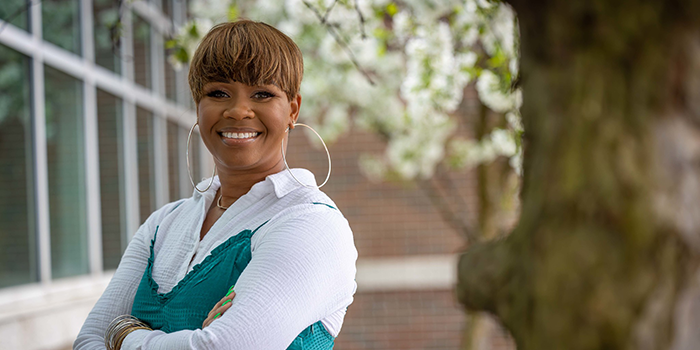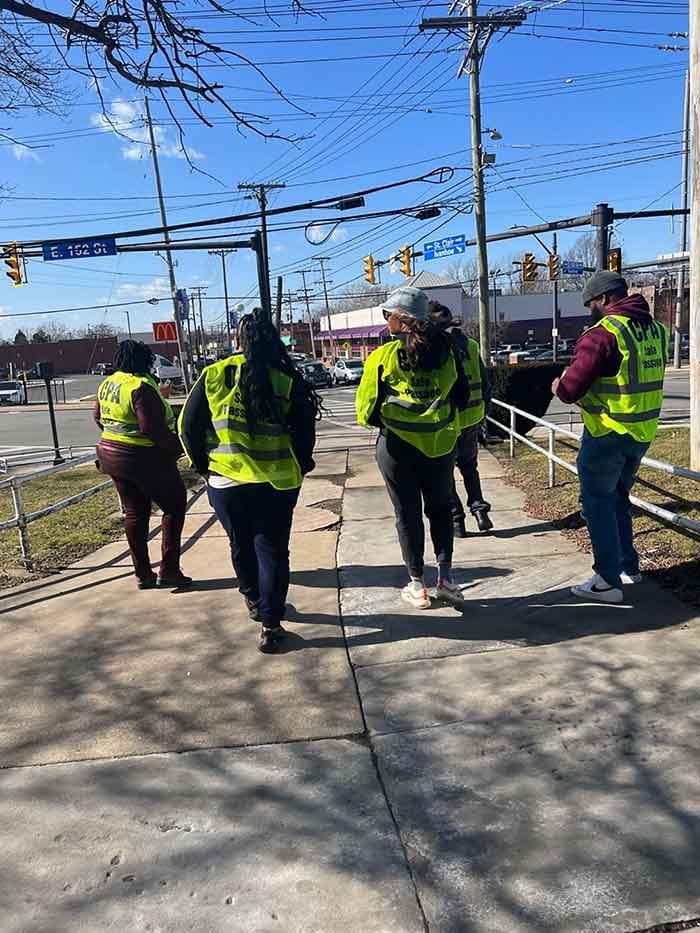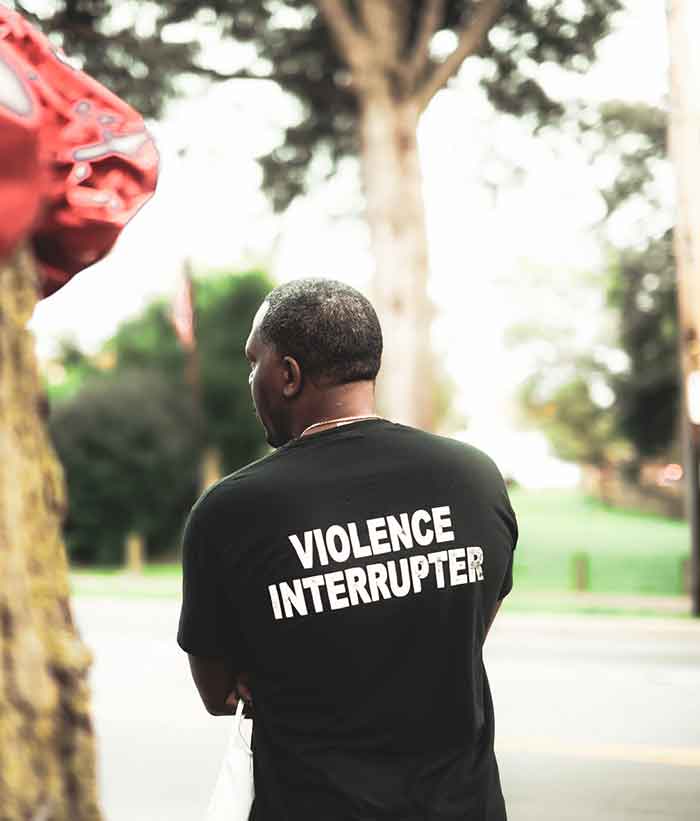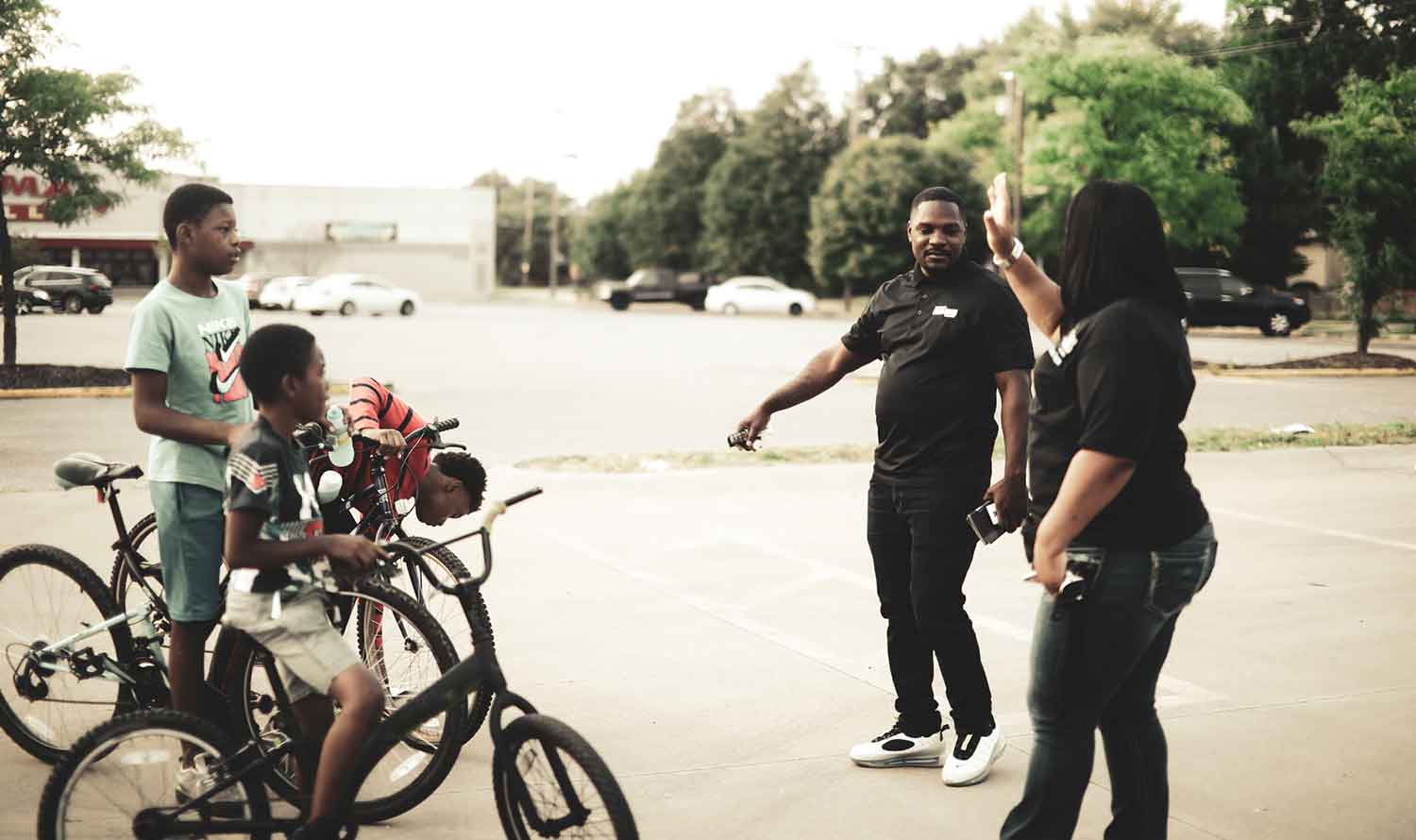Blessed Are the Peacemakers

Myesha Watkins (BSW ’10, MSW ’14) has a different relationship with her phone these days. She used to love it, but now? Not so much. These days when she gets a new text message alert, she tenses and a sense of dread rushes over. Was someone hurt? Shot? Killed?
For someone who’s life work is to reduce violence among young people in urban communities, trauma — as callous as it sounds — is par for the course, a constant companion on the road to meaningful change. But she’s hoping that won’t always be the case.
Curbing violence doesn’t just mean responding to shots fired.
That’s why, on calm days, you’ll find the nonprofit Cleveland Peacemakers Alliance (CPA) in neighborhoods in Cleveland and nearby suburbs, organizing community cleanups and hosting popup events, says Executive Director Myesha Watkins.
“Nobody wants to just see you when you show up in crisis,” Watkins says. “You’ve got to be able to show up when things are great, and also in times of need, because that’s what builds relationships and trust.”
CPA’s seven employees, including Watkins, have built a rapport with a case load of more than 200 teens and young adults. The program participants, ages 14 to 24, have been victimized by or have perpetrated violence, or have been affected by or are at high risk of experiencing violence.
The Peacemakers work with participants to practice patience and conflict resolution and to adopt coping skills, and engage them in activities like basketball, boxing and bike-riding.
Overall, the organization focuses on violence prevention, intervention and restoration. Staff members work to thin out crowds at crime scenes, de-escalate situations that could lead to retaliation, console victims and their families at the hospital, and assist teenagers and young adults in the court system.
Resources and funds from public and private sector partnerships are key, Watkins says. Cleveland’s Community Relations Board sends Peacemakers alerts about shootings, for example, and MetroHealth and University Hospitals connect the organization with victims.
Financial and programming support has come from organizations, government officials and businesses such as the Cleveland Foundation, Cuyahoga County Board of Health, U.S. Congresswoman Shontel Brown and Dominion.
Criminal justice professionals, including judges and prosecutors, have been receptive to Peacemakers, with judges providing leniency to system-impacted participants who work with the group. CPA is a stakeholder in the Cuyahoga County Common Pleas Court’s Violence Intervention Program, through which participants with felony gun possession charges can have their records wiped clean and obtain a concealed carry permit for protection.

CPA also offers safe passage to students at high schools — Collinwood, East Tech, Glenville, John F. Kennedy and John Adams — and conducts outreach at nearby recreational centers and gas stations, which are just some of the institutions and businesses where violence has occurred.
Peacemaker participants in the 18-to-24 age range share their experiences with violence to younger members.
“They’ll come back and say, ‘I want to come and support at the school. I want to use my story and encourage young people and tell them how I made it through,’” Watkins says. She adds that staff who were system-impacted also share their experiences, but not in a fearful way.
As for Watkins’ story, she became executive director of CPA in 2020 after serving as its interim director, transition manager and case manager supervisor. Prior to that, she was director of the Boys & Girls Clubs’ Broadway Club, a psychotherapist for homeless young adults and a social worker at St. Vincent Charity Medical Center.
Watkins is eager to continue expanding CPA beyond its original scope of curbing gang involvement. That street outreach was the goal — and, Watkins says, was needed — when former Cleveland Browns player Reggie Rucker founded the organization in 2007. Rucker’s mishandling of the group’s funds jeopardized its existence before the Boys & Girls Clubs of Cleveland took over its management in 2015.

Since then, the Peacemakers’ work has broadened to support victims and families in hospitals and system-impacted young people in the courts, and to provide wraparound services and interrupt violence no matter the cause, in part due to Watkins’ leadership.
“What I try to get away from is, for so long, we’ve tried to blame where the increase of gun violence starts from,” Watkins says. “But I think the pandemic has showed us that it’s hard to just pick one variable of what can increase gun violence. I think the biggest thing that we can all agree on is that if communities are underinvested in and have very limited resources, people in those communities are going to do what they have to do to figure it out.”
In neighborhoods weathered by redlining, unemployment, food insecurity and other injurious conditions, tensions run high, and Watkins says violence can stem from people showing one another disrespect.
“One of the main drivers of violence right now in our community is interpersonal, and it’s interconnected to how we respond when someone else disrespects us,” Watkins says. “And I always tell people that disrespect isn’t breaking the law, but disrespect is one of the leading variables to a lot of the community violence.”
Watkins says she and her team all grew up in Cleveland and possess a real passion for the work.
Violence can, and has, hit close to home for Peacemakers. When Watkins was a child, men broke into her home and held her, her mother and her siblings at gunpoint. One Peacemaker’s cousin was shot and killed in Bedford. “We’ve had participants who have lost their lives to gun violence,” Watkins says.
Watkins tells the story of Anthony Hughes, a student at James F. Rhodes High School who was shot 16 times after leaving a Peacemakers program at the King Kennedy Boys & Girls Club in 2020. He was 15.

“Where are our safe places in the city of Cleveland or the surrounding neighborhoods?” Watkins asks. “Where can we go if gun violence is meeting us at our schools, at our homes, in our beds, at our churches, at our grocery stores, at our community convenient locations such as a gas station? Where do we go?”
Watkins is optimistic that intergenerational cycles of violence will come to an end. News and information about everything from the COVID-19 pandemic, poor leadership and mass shootings have made impressions on America’s youth, says Watkins, who has two daughters herself, ages 10 and 6.
“I think with the newer generations is the overwhelming amount of access to information, that no one can just tell us what we should accept, that we have facts to know what better looks like,” Watkins says. “We have examples of communities that aren’t impacted by generational trauma and we have the urgency and the tenacity to follow through on all of that. So, as the mother of two daughters, I am so excited about what they’re going to do to stop the generational trauma.”
Anyone who is interested in volunteering or making monetary or in-kind donations can reach out to Watkins at mwatkins@clevepeace.org.
